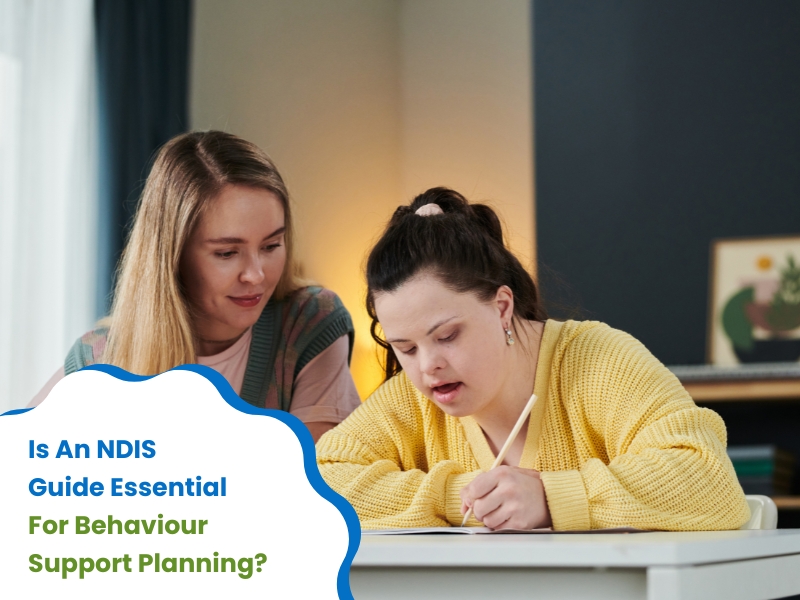Navigating the National Disability Insurance Scheme (NDIS) can be a complex journey, especially when planning for behaviour support. An NDIS guide can provide invaluable support in understanding your rights, navigating the system, and ensuring you receive the necessary assistance. This article will explore the benefits of using an NDIS guide for behaviour support planning and how it can help you achieve your goals.
What is behaviour support planning?
Behaviour support planning is a collaborative process involving individuals with disabilities, their families, and support providers to develop strategies for managing challenging behaviours. The goal is to promote positive outcomes, enhance quality of life, and foster inclusion.
How can an NDIS guide enhance behaviour support planning?
An NDIS guide can play a crucial role in enhancing behaviour support planning by:
- Providing expert guidance: NDIS guides have a deep understanding of the NDIS system and can offer specialist advice on eligibility, funding, and available support.
- Assisting with the application process: They can help you complete the necessary paperwork, gather supporting documentation, and navigate the application process.
- Advocating for your needs: NDIS guides can advocate for your rights and ensure you receive appropriate support.
- Developing personalised plans: They can assist in creating personalised behaviour support plans that address your specific needs and goals.
- Connecting you with suitable providers: NDIS guides can help you identify and connect with qualified behaviour support providers who align with your preferences.
What are the critical components of an NDIS guide?
A comprehensive NDIS guide should include the following components:
- NDIS knowledge: A thorough understanding of NDIS eligibility criteria, funding models, and available supports.
- Behaviour support expertise: Knowledge of different behaviour support strategies and best practices.
- Communication skills: Effective communication skills to facilitate collaboration between individuals, families, and support providers.
- Advocacy skills: The ability to advocate for the needs of individuals with disabilities and challenge discrimination.
- Networking capabilities: Connections with NDIS providers, community resources, and support networks.
How can an NDIS guide help you understand behaviour support services?
An NDIS guide can help you understand:
- Different types of behaviour support services: They can explain the range of services available, such as therapy, counselling, respite care, and community support.
- Funding options: They can help you understand how funding is allocated for behaviour support and explore different funding options.
- Quality standards: They can assist in identifying providers who meet NDIS quality standards and have a proven track record.

What are the benefits of using an NDIS guide for behaviour support?
Using an NDIS guide for behaviour support can offer several benefits, including:
- Increased independence: By receiving appropriate support, you can develop the skills and confidence to lead a more independent life.
- Improved quality of life: Effective behaviour support can help you manage challenges, reduce stress, and enhance your overall well-being.
- Enhanced social participation: Behaviour support can facilitate participation in community activities and social interactions.
- Peace of mind: Knowing that you have a trusted guide to support you can provide peace of mind for you and your family.
Can an NDIS guide enhance communication with behaviour support professionals?
An NDIS guide can mediate between you and behaviour support professionals, clearly communicating your needs and preferences. They can help you:
- Express your concerns and goals: They can help you articulate your needs and expectations clearly and concisely.
- Understand treatment plans: They can help you understand their rationale and ask questions.
- Advocate for changes: If you are not satisfied with the services you are receiving, an NDIS guide can advocate for changes.
Are there any challenges in implementing an NDIS guide?
While using an NDIS guide can be a valuable asset in your NDIS journey, it’s essential to be aware of potential challenges:
- Finding the Right Fit: Locating an NDIS guide who truly understands your needs and aligns with your values can be time-consuming. Thorough research and consideration of experience, qualifications, and communication style are essential.
- Financial Considerations: Some NDIS guides may charge a fee for their services. It’s crucial to factor this into your budget and explore funding options.
- Time Investment: Working with an NDIS guide requires a certain level of time commitment. You should schedule regular meetings, provide information, and actively participate in planning. However, the investment of time is often outweighed by the benefits of having a dedicated advocate.
- Potential Misalignment: While NDIS guides are experts, there’s always a risk of misalignment between your expectations and their approach. It’s important to communicate openly and be prepared to adjust your plan as needed.
- Limited Availability: Depending on your location, a limited number of NDIS guides might be available, making it challenging to find one that can meet your specific requirements.
How can you get started with an NDIS guide for behaviour support?
If you are considering using an NDIS guide for behaviour support, here are some steps you can take:
- Utilise Local Resources: Explore local resources like disability service organisations, community centres, or NDIS information hubs. These organisations often have lists of recommended NDIS guides in your area.
- Online Research: Conduct online searches using keywords like “NDIS guide,” “behaviour support,” and your specific location. Websites like NDIS.gov.au or disability forums may have information on available guides.
- Word of Mouth: Ask friends, family, or other individuals with disabilities for recommendations. Personal referrals can be a great way to find a trustworthy guide.
- Social Media: Connect with disability support groups or NDIS-related communities on social media. You might find recommendations or discussions about NDIS guides there.
- Contact Your Local NDIS Agency: Reach out to your local NDIS agency for information on available support and resources. They can provide recommended guides and information on accessing the best NDIS therapy.

Conclusion
An NDIS guide can be a valuable asset in planning for behaviour support. They can help you navigate the NDIS system and achieve your goals by providing expert guidance, advocacy, and support. If you are considering using an NDIS guide, it is essential to research your options and find a guide that aligns with your needs.
Start your NDIS journey today with Auburn Health Centre!
At Auburn Health Centre, we are committed to providing personalised behaviour support services to individuals with disabilities. Our experienced team of professionals can help you develop a comprehensive plan that addresses your unique needs and goals. Contact Auburn Health Centre today to learn how we can support you on your NDIS journey.


